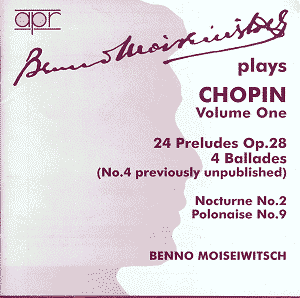Moiseiwitsch had recorded the Preludes in 1921 and 1924 but
neither acoustic set was issued. Returning to them in 1948 (and for some
remakes the following year which were not ultimately used) he left a legacy
of august Chopin playing but not one that, as Bryan Crimp’s notes relate,
stayed for long in the catalogue. When the Preludes were re-released on
LP – which was in America only – only Preludes 11-24 were included, a
rather baffling situation but the fact remains that this is the first
time that they have been re-issued in their entirety; Testament has more
recently issued the set as well.
I recently reviewed an all-Tchaikovsky set from APR,
which saw Moiseiwitsch at the War’s end on rather depleted form. Here
three years and more later he is the Moiseiwitsch of old, translucent,
tonally beautiful, an unrivalled colourist, architect and arch romantic.
All his manifold gifts are vested on Op 28 and always in the service
of the music – others may wrest more obviously dramatic theatricality
from the individual Preludes but few have lavished such sheer beauty
of tone on them or have served the imperatives of architectural cogency
with such discernment or distinction.
Thus whilst he may appear to be somewhat reserved in
the early preludes – the C Major is brisk, the E Minor Largo rather
straight - his convincing trajectory becomes more and more apparent.
The A Major Andantino is unreservedly beautiful, his legato in the F
Sharp Major Lento magnificent, the way in which he sustains the Sostenuto
No 15 a little miracle of touch and poetic drama, the phrasal interconnectedness
made whole. His subtle colouristic sense is undimmed here, the subtlety
of his rubati still wonderful and the Preludes emerge in his hands almost
miraculously whole, not merely as a series of incidental felicities.
As a significant bonus there are the four Ballades, the second Nocturne
and the B Flat Polonaise, No 9. In the second Nocturne there is everything
one would want – poetry, nuance, a dreamy introspection, subtle interplay
of left and right hand. Of the Ballades the first, from 1938 with a
remake from the following year, is full of high drama and drive, the
second, recorded almost a decade later fuses inwardness and whirlwind
passion, tempestuous yet as ever with Moiseiwitsch musically controlled.
The fourth Ballade is of particular interest. Recorded in 1947 – at
the same session as the second – it was never issued. Passionate, colouristic,
cogent it emerges, in fine sound, as an impressive achievement.
Moiseiwitsch’s Chopin belongs in the highest company.
Felicitously transferred, with comprehensive notes and with the important
addition of the F Minor Ballade, this is a pretty much a self-recommending
disc.
Jonathan Woolf


